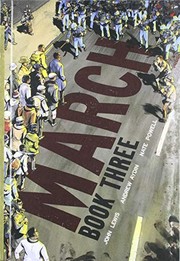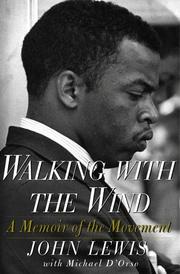Often called "one of the most courageous persons the Civil Rights Movement ever produced," John Lewis has dedicated his life to protecting human rights, securing civil liberties, and building what he calls "The Beloved Community” in America. His dedication to the highest ethical standards and moral principles has won him the admiration of many of his colleagues on both sides of the aisle in the United States Congress.
He has been called "the conscience of the U.S. Congress,” and Roll Call magazine has said, "John Lewis…is a genuine American hero and moral leader who commands widespread respect in the chamber.”
He was born the son of sharecroppers on February 21, 1940, outside of Troy, Alabama. He grew up on his family's farm and attended segregated public schools in Pike County, Alabama. As a young boy, he was inspired by the activism surrounding the Montgomery Bus Boycott and the words of the Rev. Martin Luther King Jr., which he heard on radio broadcasts. In those pivotal moments, he made a decision to become a part of the Civil Rights Movement. Ever since then, he has remained at the vanguard of progressive social movements and the human rights struggle in the United States.
As a student at Fisk University, John Lewis organized sit-in demonstrations at segregated lunch counters in Nashville, Tennessee. In 1961, he volunteered to participate in the Freedom Rides, which challenged segregation at interstate bus terminals across the South. Lewis risked his life on those Rides many times by simply sitting in seats reserved for white patrons. He was also beaten severely by angry mobs and arrested by police for challenging the injustice of Jim Crow segregation in the South.
During the height of the Movement, from 1963 to 1966, Lewis was named Chairman of the Student Nonviolent Coordinating Committee (SNCC), which he helped form. SNCC was largely responsible for organizing student activism in the Movement, including sit-ins and other activities.
While still a young man, John Lewis became a nationally recognized leader. By 1963, he was dubbed one of the Big Six leaders of the Civil Rights Movement. At the age of 23, he was an architect of and a keynote speaker at the historic March on Washington in August 1963.
In 1964, John Lewis coordinated SNCC efforts to organize voter registration drives and community action programs during the Mississippi Freedom Summer. The following year, Lewis helped spearhead one of the most seminal moments of the Civil Rights Movement. Hosea Williams, another notable Civil Rights leader, and John Lewis led over 600 peaceful, orderly protestors across the Edmund Pettus Bridge in Selma, Alabama on March 7, 1965. They intended to march from Selma to Montgomery to demonstrate the need for voting rights in the state. The marchers were attacked by Alabama state troopers in a brutal confrontation that became known as "Bloody Sunday." News broadcasts and photographs revealing the senseless cruelty of the segregated South helped hasten the passage of the Voting Rights Act of 1965.
Despite more than 40 arrests, physical attacks and serious injuries, John Lewis remained a devoted advocate of the philosophy of nonviolence. After leaving SNCC in 1966, he continued his commitment to the Civil Rights Movement as Associate Director of the Field Foundation and his participation in the Southern Regional Council's voter registration programs. Lewis went on to become the Director of the Voter Education Project (VEP). Under his leadership, the VEP transformed the nation's political climate by adding nearly four million minorities to the voter rolls.
In 1977, John Lewis was appointed by President Jimmy Carter to direct more than 250,000 volunteers of ACTION, the federal volunteer agency.
In 1981, he was elected to the Atlanta City Council. While serving on the Council, he was an advocate for ethics in government and neighborhood preservation. He was elected to Congress in November 1986 and has served as U.S. Representative of Georgia's Fifth Congressional District since then. He is Senior Chief Deputy Whip for the Democratic Party in leadership in the House, a member of the House Ways & Means Committee, and Chairman of its Subcommittee on Oversight.
John Lewis holds a B.A. in Religion and Philosophy from Fisk University, and he is a graduate of the American Baptist Theological Seminary, both in Nashville, Tennessee. He has been awarded over 50 honorary degrees from prestigious colleges and universities throughout the United States, including Harvard University, Brown University, the University of Pennsylvania, Princeton University, Duke University, Morehouse College, Clark-Atlanta University, Howard University, Brandeis University, Columbia University, Fisk University, and Troy State University.
John Lewis is the recipient of numerous awards from eminent national and international institutions, including the highest civilian honor granted by President Barack Obama, the Medal of Freedom, the Lincoln Medal from the historic Ford’s Theatre, the Golden Plate Award given by the Academy of Excellence, the Preservation Hero award given by the National Trust for Historic Preservation, the Capital Award of the National Council of La Raza, the Martin Luther King, Jr. Non-Violent Peace Prize, the President’s Medal of Georgetown University, the NAACP Spingarn Medal, the National Education Association Martin Luther King Jr. Memorial Award, and the only John F. Kennedy "Profile in Courage Award" for Lifetime Achievement ever granted by the John F. Kennedy Library Foundation.
John Lewis is the co-author of the National Book Award winning and #1 New York Times bestselling graphic novel memoir trilogy MARCH, written with Andrew Aydin and illustrated by Nate Powell. The first volume, MARCH: Book One, received a 2014 American Library Association (ALA) Coretta Scott King Book Award Author Honor, an ALA Notable Children's Book designation, was named one of YALSA's 2014 Top Ten Great Graphic Novels for Teens, and became the first graphic novel ever to receive a Robert F. Kennedy Book Award. MARCH: Book Two was released in 2015 and immediately became both a New York Times and Washington Post bestseller. MARCH: Book Two was awarded the comic industry's highest honor, the Will Eisner Award, as well as two Harvey awards among other honors. MARCH: Book Three was released in 2016, debuted at #1 on the New York Times Bestseller list, and became the first comics work to ever win the National Book Award. In January 2017, MARCH: Book Three made history again by winning four ALA Youth Media Awards, including the Printz Award, the Sibert Medal, the Coretta Scott King Author Book Award, and the YALSA Excellence in Nonfiction Award, becoming the first book to ever win four Youth Media Awards in a single year and cementing the MARCH Trilogy's place at the pinnacle of comics and young adult literature.
The MARCH trilogy has been adopted into the core curriculm of school systems across the country to teach the Civil Rights Movement to the next generation, and has been selected as a First-Year common reading text at colleges and universities such as Michigan State University, Georgia State University, Marquette University, University of Utah, Henderson State University, University of Illinois Springfield, Washburn University, and many others. He is also the author of Across That Bridge: Life Lessons and a Vision for Change, written with Brenda Jones, and winner of the 2012 NAACP Image Award for Best Literary Work-Biography. His biography, published in 1998, is entitled Walking With The Wind: A Memoir of the Movement. Written with Michael D'Orso, Walking With The Wind is a receipient of the Anisfield-Wolf Book Award as well as the Robert F. Kennedy Book Award. He is also the subject of two other books written about his life: Freedom Riders: John Lewis and Jim Zwerg on the Front Lines of the Civil Rights Movement, by Ann Bausum and John Lewis in the Lead, by Jim Haskins and Kathleen Benson, with illustrations by famous Georgia artist, Bennie Andrews.
He has been interviewed for numerous documentaries, news broadcasts, and journals, including the The Late Show with Stephen Colbert, Morning Joe, the Rachel Maddow Show, the Today show, CNN Headline News, CNN’s American Morning, CSPAN’s Washington Journal, Time Magazine, Newsweek Magazine, The New Yorker, The New York Times, The Washington Post, USA Today, the Atlanta Journal Constitution, the Boston Globe, the Dallas Morning News, the Miami Herald, the Philadelphia Tribune, Roll Call magazine, and many more.
John Lewis lives in Atlanta, Georgia. He has one son, John Miles.
(source)
John Lewis
×Close
American politician and civil rights leader (1940–2020)
| Born | 21 Feb 1940 |
| Died | 17 Jul 2020 |
8 works Add another?

Most Editions
Most Editions
First Published
Most Recent
Top Rated
Reading Log
Random
Showing all works by author. Would you like to see only ebooks?
John Lewis
×Close
American politician and civil rights leader (1940–2020)
| Born | 21 Feb 1940 |
| Died | 17 Jul 2020 |
Subjects
African American civil rights workers, African American legislators, Civil rights movements, Student Nonviolent Coordinating Committee (U.S.), United states, congress, house, biography, African Americans, Biography, Civil rights, Civil rights movements, united states, Civil rights workers, African americans, biography, Comic books, strips, Comics & graphic novels, nonfiction, biography & memoir, Legislators, New York Times bestseller, United States, United States. Congress. House, United states, race relations, Comic, Graphic novels, African American Nonfiction, African american legislators, African americans, civil rights, Amerikanisches Englisch, Cultural HeritagePlaces
United States, Southern States, Alabama, American Baptist Theological Seminary, Bridge, Buffalo, Edmund Pettus, First Baptist Church, Greensboro, Kansas, Kentucky, Montgomery, Nashville, New York, North Carolina, Ohio, Pike County, Selma, Tennessee, Tennessee State University, Topeka, Vanderbilt University Divinity School, Washington D.C., Woolworth'sPeople
Alexander Looby, Ben West, Diane Nash, Fred Gray, Greensboro Four, James Lawson, John Lewis, John Lewis (1940 Feb. 21-), John Lewis (1940-2020), Martin Luther King Jr. (1929-1968), Ralph Abernathy, Rosa Parks Coreen HarveyID Numbers
- OLID: OL25424A
- ISNI: 0000000114586629
- VIAF: 164971276
- Wikidata: Q45380
- Inventaire.io: wd:Q45380
Links outside Open Library
No links yet. Add one?
Alternative names
- Lewis, John
| September 27, 2020 | Edited by MARC Bot | add ids |
| July 21, 2020 | Edited by dcapillae | Updated date of birth and death |
| January 1, 2020 | Edited by Lisa | bio, photo, link |
| January 1, 2020 | Edited by Lisa | Added new photo |
| April 1, 2008 | Created by an anonymous user | initial import |







